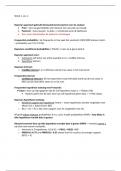The chain of responsiveness
Powell begins by specifying two concepts to ensure we have the same understanding of said
concepts:
● Democracy
○ Which is identified by the universal adult right to vote, free and competitive
elections where we choose our policy makers, the access to multiple
information sources, multiple political parties and the existence of civil and
political rights.
● Democratic responsiveness
○ Which is identified as when the democratic process leads to the government
to form and implement policies that citizens actually want. When a democracy
consistently imposes policies that citizens want then we classify it as a high
quality democracy.
Responsiveness is not the only way we measure demcoratic quality. We also use:
Freedom, equality, vertical and horizontal accountability, and the quality of the rule of law.
These all contribute directly to the quality of democracy and facilitate democratic
responsiveness.
Democratic responsiveness is complex, it begins with the policy preferences which are
held by citizens and then moves link by link as a chain through stages such as:
- VOting
- election outcomes
- the formation of policy/making coalitions
- the process of policy making between elections
- public policies themselves.
Democratic responsiveness is an ongoing and dynamic process in which the adopted
policies have consequences and affect the future preferences of citizens.
The above picture shows the stages and linkages of democratic responsiveness. If any of
the major linkages is broken then that would cause failure of responsiveness. We reach a
high quality democracy and sustain it through institutional arrangements which support each
of the major linkages of responsiveness.
, This can be done through:
1) The systemic eviction of unresponsive or inept policy makers. Encouraging
successors to anticipate and realize citizens desires more carefully.
2) The direct election of powerful, promise keeping governments that are publicly
committed to policies the citizens want
3) the election of multiple representative parties that are committed to negotiating as
agents on behalf of respective policies favored by the various subgroups of citizens
who elected them.
Conceptual difficulties and theoretical disputes
It is difficult to fully evaluate and compare democratic responsiveness over time and
between countries. Theoretical and empirical research has shown that in evaluating
democratic responsiveness there are several key concepts such as:
- Citizens preferences
- Election outcomes
- Political influence
- Policy consequences
These pose complex analytical challenges as they vary so wildly between countries and over
time.
In addition there are many connections in the democratic process that can break down or be
subverted which vary wildly from case to case.
Lastly theories differ as to which causes and consequences affect each connection at each
stage of the political process.
Linkage 1 - structuring choices between citizens preferences <-> Citizens voting
behavior
If we look at the above image there are several defined linkages, the first being ‘structuring
choices’’. This connection involves both citizens and the alternatives presented to them at
the time of elections. In order for a functioning structuring choices linkages require an
educated citizenry.
Problems with linkage 1:
A problem which can happen in a winner take all situation where there are many alternatives
is that there may not be a clear majority winner. This is called ‘arrows impossibility theorem’
this theorem implies uncertainty when there are three or more alternatives.
A problem which can occur during the first linkage is the fact that we cannot truly know what
the people want. On this basis Rikers argues for procedural assessments of democracy in
which a majority of citizens can collectively remove an incumbent government → basically a
referendum against your government. Rikers however does not argue for a ‘referendum’
against specific policies.
Important for functioning:
The party system must make it possible for citizens to express their needs. If none of the
existing parties cater to the needs of citizens then the chain is broken at the first linkage,
there is no democratic responsiveness.
Powell begins by specifying two concepts to ensure we have the same understanding of said
concepts:
● Democracy
○ Which is identified by the universal adult right to vote, free and competitive
elections where we choose our policy makers, the access to multiple
information sources, multiple political parties and the existence of civil and
political rights.
● Democratic responsiveness
○ Which is identified as when the democratic process leads to the government
to form and implement policies that citizens actually want. When a democracy
consistently imposes policies that citizens want then we classify it as a high
quality democracy.
Responsiveness is not the only way we measure demcoratic quality. We also use:
Freedom, equality, vertical and horizontal accountability, and the quality of the rule of law.
These all contribute directly to the quality of democracy and facilitate democratic
responsiveness.
Democratic responsiveness is complex, it begins with the policy preferences which are
held by citizens and then moves link by link as a chain through stages such as:
- VOting
- election outcomes
- the formation of policy/making coalitions
- the process of policy making between elections
- public policies themselves.
Democratic responsiveness is an ongoing and dynamic process in which the adopted
policies have consequences and affect the future preferences of citizens.
The above picture shows the stages and linkages of democratic responsiveness. If any of
the major linkages is broken then that would cause failure of responsiveness. We reach a
high quality democracy and sustain it through institutional arrangements which support each
of the major linkages of responsiveness.
, This can be done through:
1) The systemic eviction of unresponsive or inept policy makers. Encouraging
successors to anticipate and realize citizens desires more carefully.
2) The direct election of powerful, promise keeping governments that are publicly
committed to policies the citizens want
3) the election of multiple representative parties that are committed to negotiating as
agents on behalf of respective policies favored by the various subgroups of citizens
who elected them.
Conceptual difficulties and theoretical disputes
It is difficult to fully evaluate and compare democratic responsiveness over time and
between countries. Theoretical and empirical research has shown that in evaluating
democratic responsiveness there are several key concepts such as:
- Citizens preferences
- Election outcomes
- Political influence
- Policy consequences
These pose complex analytical challenges as they vary so wildly between countries and over
time.
In addition there are many connections in the democratic process that can break down or be
subverted which vary wildly from case to case.
Lastly theories differ as to which causes and consequences affect each connection at each
stage of the political process.
Linkage 1 - structuring choices between citizens preferences <-> Citizens voting
behavior
If we look at the above image there are several defined linkages, the first being ‘structuring
choices’’. This connection involves both citizens and the alternatives presented to them at
the time of elections. In order for a functioning structuring choices linkages require an
educated citizenry.
Problems with linkage 1:
A problem which can happen in a winner take all situation where there are many alternatives
is that there may not be a clear majority winner. This is called ‘arrows impossibility theorem’
this theorem implies uncertainty when there are three or more alternatives.
A problem which can occur during the first linkage is the fact that we cannot truly know what
the people want. On this basis Rikers argues for procedural assessments of democracy in
which a majority of citizens can collectively remove an incumbent government → basically a
referendum against your government. Rikers however does not argue for a ‘referendum’
against specific policies.
Important for functioning:
The party system must make it possible for citizens to express their needs. If none of the
existing parties cater to the needs of citizens then the chain is broken at the first linkage,
there is no democratic responsiveness.







